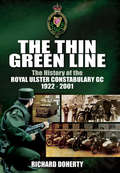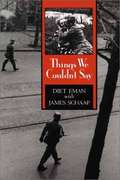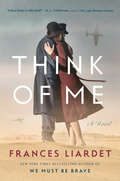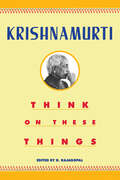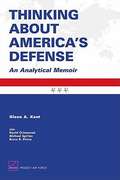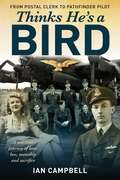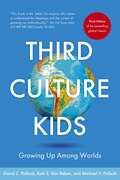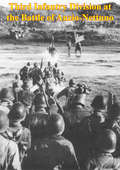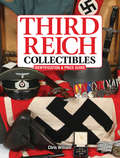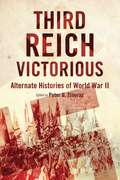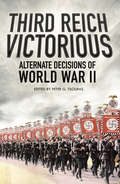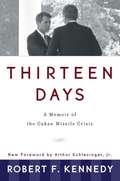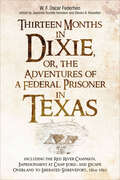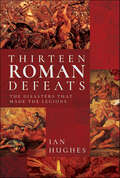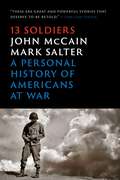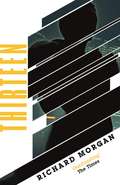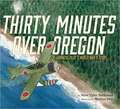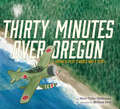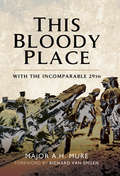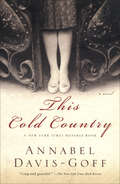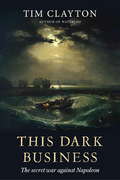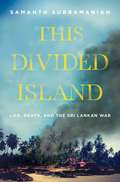- Table View
- List View
Thin Green Line: The History of the Royal Ulster Constabulary GC, 1922–2001
by Richard DohertyFormed out of the Royal Irish Constabulary at the time of Partition, the RUC's history is predictably a turbulent one right through to its replacement in 2001 by the Police Service of Northern Ireland. Few police forces in the world have suffered so grievously as the RUC and this book is a fitting memorial to the sacrifices made in the interests of the civil population it was determined to protect. Throughout its history, it has not only had to perform normal police duties but contain the ever present IRA threat. In 1969, the climate changed and ushered in a new and even more violent era of sectarian strife. The emergence of extreme nationalist organizations posed grave problems and, with the RUC in a prime role, the position of the Chief Constable was hugely important. This book tells the story of a remarkable police force without fear or favor. Ironically its reward for containing a hugely challenging internal security situation and at the same time policing the community traditionally was its disbandment.
Things We Couldn't Say
by Diet Eman James SchaapTrue story of Diet Eman, a young Dutch woman who, with her fiancé, risked her life to rescue Jews from Nazi-occupied Holland during World War II. Later edition subtitled "A dramatic account of Christian resistance in Holland during WWII
Think of Me
by Frances LiardetFrom the New York Times bestselling author of We Must Be Brave comes a new sweeping historical novel about one couple&’s journey through war, love, and loss, and how the people we love never really leave us. 1942, Alexandria, Egypt. Covered in dust, Yvette and James hold hands for the first time as bombs explode above them. As World War II rages on, they will find their way back to each other time and again, their love a beacon for their survival. After the war, they make a life together in England, where happiness takes root and blossoms, until a tragic event drives a wedge between them. The path back to one another is uncharted territory that both must be brave enough to face. 1974, England. Ten years after his wife&’s death, James moves to the English village of Upton seeking change. There he discovers a scarf that lights the dark edges of his memory. Could it be Yvette's? As James makes a new home for himself, he begins to unlock revelations about his past that just might return his lost faith to him—faith in humanity, in himself, and perhaps most important of all, his faith in love. Captivating and inspiring, Think of Me explores the power of love to echo across the years, and its power to save.
Think on These Things
by Jiddu Krishnamurti‘The material contained in this volume was originally presented in the form of talks to students, teachers and parents in India, but its keen penetration and lucid simplicity will be deeply meaningful to thoughtful people everywhere, of all ages, and in every walk of life. Krishnamurti examines with characteristic objectivity and insight the expressions of what we are pleased to call our culture, our education, religion, politics and tradition; and he throws much light on such basic emotions as ambition, greed and envy, the desire for security and the lust for power – all of which he shows to be deteriorating factors in human society.’From the Editor’s Note‘Krishnamurti’s observations and explorations of modern man’s estate are penetrating and profound, yet given with a disarming simplicity and directness. To listen to him or to read his thoughts is to face oneself and the world with an astonishing morning freshness.’Anne Marrow Lindbergh
Thinking About America's Defense
by David R. Frelinger Glenn A. KentLieutenant General Glenn A. Kent was a uniquely acute analyst and developerof American defense policy in the second half of the twentieth century. His33-year career in the Air Force was followed by more than 20 years as one ofthe leading analysts at RAND. This volume is not a memoir in the normalsense but rather a summary of the dozens of national security issues inwhich Glenn was personally engaged over the course of his career. Theseissues included creating the single integrated operational plan (SIOP),leading DoD's official assessment of strategic defenses in the 1960s,developing and analyzing strategic nuclear arms control agreements, helpingto bring new weapon systems to life, and many others. Each vignettedescribes the analytical frameworks and, where appropriate, the mathematicalformulas and charts that Glenn developed and applied to gain insights intothe issue at hand. The author also relates his roles in much of thebureaucratic pulling and hauling that occurred as issues were addressedwithin the government.
Thinks He's a Bird: From Postal Clerk to Pathfinder Pilot
by Ian CampbellA remarkable and powerful story of indomitable human spirit, passion and courage.In 1941 when Keith Watson, a teenage postal clerk from country Queensland, enlisted in the RAAF, he had absolutely no idea what he was getting himself into. The following four years were an adrenaline-filled ride of love, loss, mateship, ambition, courage and sacrifice, all recorded in an intimate 800-page diary. This is an account of how war tests character and puts the young on an accelerated path to maturity. From childhood and his first inspirational flight to his emergence as an elite Path Finder Force pilot, Keith&’s story is compelling and tragic, yet uplifting. He confronts constant death and injury, challenges authority, learns to skipper a crew and finds his trademark humility running headlong into ego and ambition. Keith&’s graphic accounts of Pathfinder missions bring a deepening sense of the relentless physical and psychological toll on the crews of Bomber Command. Counterbalancing these experiences are Keith&’s relationships with wartime mates, the woman who loved him, and the UK families who sacrificed much on his behalf. Based on material never before released, Thinks He&’s A Bird is a stunning account of service, sacrifice and two enduring and competing passions – flying and Norah, the love of Keith&’s life. ,
Third Culture Kids: The Experience of Growing Up Among Worlds: The original, classic book on TCKs
by David C. Pollock Ruth E. Reken Michael V. PollockFor more than a decade, Third Culture Kids has been the authority on "TCKs" - children of expatriates, missionaries, military personnel and others who live and work abroad. With a significant part of their developmental years spent outside of their passport country, TCKs create their own, unique "third" cultures. Authors Pollock and Van Reken pioneered the TCK profile, which brought to light the emotional and psychological realities that come with the TCK journey, often resulting in feelings of rootlessness and grief but also an increased confidence and ability to interact with many cultures. Through interviews and personal writings, this new, expanded edition explores the challenges and benefits that TCKs encounter, and also widens the net to discuss the experiences of CCKs, cross-cultural kids, who are immigrants, international adoptees or the children of biracial or bicultural parents. Highlighting dramatic changes brought about by instant communication and ever-evolving mobility patterns, Third Culture Kids reveals the hidden diversity in our world and challenges traditional notions of identity and "home" - and shows us how the TCK experience is becoming increasingly common and valuable.
Third Infantry Division At The Battle Of Anzio-Nettuno
by Lt.-Col Gregory A. HardingThis is a historical narrative of the Third Infantry Division's experiences at the Anzio-Nettuno beachhead from 22 January to 2 June 1944. It identifies major contributing factors to the Third Infantry Division's battlefield success at the battle of Anzio-Nettuno. The battle is broken down into five distinct stages and investigated in a chronological manner. Potentially significant factors are evaluated in each stage of the battle and include terrain, weather, Allied air superiority, and the quality of military intelligence available to the Third Infantry Division's commander. Also compared for each side are the quality of senior leadership, previous combat experience, the quality and quantity of manpower replacements, and available artillery resources. This thesis concludes that the Third Infantry Division's battlefield success at Anzio-Nettuno appears to have been, to a large extent, a result of the quality and stability of the division's senior leadership, failures and missteps on the part of the higher German command echelons, the division's masterful employment of field artillery, and a highly effective training program.
Third Reich Collectibles: Identification and Price Guide
by Chris WilliamThe rise and fall of Germany's Third Reich is one of the most studied, investigated and collected episodes of military history. A reign of terror that rose to near world domination during the 1930s and early 1940s, Adolph Hitler's Germany continues to fascinate generations of scholars and students of history alike.The Third Reich's insatiable drumbeat of pageantry and propaganda produced countless uniforms, insignia, medals, flags, daggers, swords, and headgear, comprising one of the most desired categories in all of military collectibles to study, understand and own.Groundbreaking in scope and execution, Third Reich Collectibles features more than 1,300 color images with descriptions and values for:UniformsHelmetsHeadgearFlagsBadgesMembership pinsPatchesArmbandsFirearmsBladesEquipmentPaper IDsSignageAnd more associated with the military and paramilitary groups of the Third ReichThroughout the book you'll also find historical background information and period photographs capturing everyday Nazi Germany.
Third Reich Victorious: Alternate Histories of World War II
by Peter G. Tsouras<P> This book is a stimulating and entirely plausible insight into how Hitler and his generals might have defeated the Allies, and a convincing sideways look at the Third Reich's bid at world domination in World War II. <P> What would have happened if, for example, the Germans captured the whole of the BEF at Dunkirk? Or if the RAF had been defeated in the Battle of Britain? What if the U-Boats had strangled Britain with an impregnable blockade, if Rommel had been triumphant in North Africa or the Germans had beaten the Red Army at Kursk? The authors, writing as if these and other world-changing events had really happened, project realistic scenarios based on the true capabilities and circumstances of the opposing forces. Third Reich Victorious is a dynamic and eye-opening alternate history that opens up the dramatic possibilities of World War II.
Third Reich Victorious: Alternative Decisions of World War II
by Peter G. TsourasThis book is a stimulating and entirely plausible insight into how Hitler and his generals might have defeated the Allies, and a convincing sideways look at the Third Reich's bid at world domination in World War II. What would have happened if, for example, the Germans captured the whole of the BEF at Dunkirk? Or if the RAF had been defeated in the Battle of Britain? What if the U-Boats had strangled Britain with an impregnable blockade, if Rommel had been triumphant in North Africa or the Germans had beaten the Red Army at Kursk? The authors, writing as if these and other world-changing events had really happened, project realistic scenarios based on the true capabilities and circumstances of the opposing forces. Third Reich Victorious is a spirited and terrifying alternate history, and a telling insight into the dramatic possibilities of World War II.
Thirteen Days: A Memoir of the Cuban Missile Crisis
by Robert F. KennedyWhen the United States confronted the Soviet Union over its installation of missiles in Cuba in October 1962, few people shared the behind-the-scenes story as it is told here by the late Senator Robert F. Kennedy. In this unique account, he describes the hour-by-hour negotiations, with particular attention to the actions and views of his brother, President John F. Kennedy.
Thirteen Months in Dixie, or, the Adventures of a Federal Prisoner in Texas: Including the Red River Campaign, Imprisonment at Camp Ford, and Escape Overland to Liberated Shreveport, 1864-1865
by W. F. FederhenThirteen Months in Dixie tells a rollicking tale of adventure, captivity, hardship, and heroism during the last year of the Civil War—in the protagonist’s own words. After being hidden away for decades as a family heirloom, the incredible manuscript is finally available, annotated and illustrated, for the first time. Oscar Federhen was a new recruit to the 13th Independent Battery, Massachusetts Light Artillery, when he shipped out to Louisiana in the spring of 1864 to participate in the Red River Campaign. Not long after his arrival at the front, a combination of ill-luck and bad timing led to his capture. Federhen was marched overland to Tyler, Texas, where he was held as a prisoner of war in Camp Ford, the largest POW camp west of the Mississippi River. Thirteen Months in Dixie recounts Federhen’s always thrilling and occasionally horrifying ordeals as a starving prisoner. The captured artillerist tried his hand at escaping several times and faced sadistic guards and vicious hounds before finally succeeding. But his ordeal was just beginning. The young soldier faced a series of challenges as he made his way cross-country through northeast Texas to reach Union lines. Federhen had to dodge regular Confederates, brigands, and even Comanches in his effort to get home. He rode for a time with Rebel irregular cavalry, during which he witnessed robberies and even cold-blooded murder. When he was recaptured and thought to be a potential deserter, he escaped yet again and continued his bid for freedom. Federhen wrote his recollections in lively engaging style not long after the war, but they sat unpublished until Jeaninne Surette Honstein and Steven Knowlton carefully transcribed and annotated his incredible manuscript. Numerous illustrations grace the pages, including two from Federhen’s own pen. Thirteen Months in Dixie is not only a gripping true story that would have otherwise been lost to history, but a valuable primary source about the lives of Civil War prisoners and everyday Texans during the conflict.
Thirteen Roman Defeats: The Disasters That Made The Legions
by Ian HughesThere is no doubt that Rome developed one of the most efficient and successful military systems of the ancient world. The famous legions conquered from the Atlantic to the Euphrates, from the Scottish Highlands to the sands of the Sahara, defeating all manner of enemies. Although their victories were many, they were never invincible and did suffer significant defeats. Ian Hughes looks at thirteen such occasions, narrating the course of the fighting (in as much detail as the sources allow), describing the forces involved, the strategy and tactics employed and the reasons for the Roman defeat. The chosen battles span the centuries, from the disastrous battle against invading Celts at the Allia River in (387 or 386 BC) to the naval defeat by the Vandals off Cap Bon in AD 468. They are selected either for the magnitude of the tactical defeat or the political and strategic significance of the outcome. Apart from the inherent interest in the individual battles, this study offers a survey of the development of the Roman forces evolving to survive.
Thirteen Soldiers: A Personal History of Americans at War
by Mark Salter John McCainA personal history of war from bestselling authors John McCain and Mark Salter, told through the stories of thirteen remarkable American soldiers who fought in the nation’s major military conflicts, from the Revolution of 1776 through the wars in Iraq and Afghanistan.As a veteran himself, a member of the Senate Armed Services Committee, and a long-time student of history, John McCain brings a distinctive perspective to the experience of war. With Mark Salter, Thirteen Soldiers tells the stories of real soldiers who personify valor, obedience, enterprise, and love. You’ll meet Joseph Plumb Martin, who at the tender age of fifteen fought in the Revolutionary War; Charles Black, a freeborn African American sailor in the War of 1812; and Sam Chamberlain, of the Mexican American War, whose life inspired novelist Cormac McCarthy. Then there’s Oliver Wendell Holmes, an aristocratic idealist disillusioned by the Civil War, and Littleton “Tony” Waller, court-martialed for refusing to massacre Filipino civilians. Each story illustrates a particular aspect of war, such as Mary Rhoads, an Army reservist forever changed by an Iraqi scud missile attack during the Persian Gulf War; Monica Lin Brown, a frontline medic in rural Afghanistan who saved several lives in a convoy ambush; and Michael Monsoor, a Navy SEAL, who smothered a grenade before it could detonate on his men in Iraq. From their acts of self-sacrifice to their astonishing valor in the face of unimaginable danger, these “inspirational accounts of thirteen Americans who fought in various wars…aptly reveal humanizing moments in such theaters of cruelty” (Publishers Weekly).
Thirteen: Previously published as BLACK MAN
by Richard MorganOne hundred years from now, and against all the odds, Earth has found a new stability; the political order has reached some sort of balance, and the new colony on Mars is growing. But the fraught years of the 21st century have left an uneasy legacy ...Genetically engineered alpha males, designed to fight the century's wars have no wars to fight and are surplus to requirements. And a man bred and designed to fight is a dangerous man to have around in peacetime. Many of them have left for Mars but now one has come back and killed everyone else on the shuttle he returned in.Only one man, a genengineered ex-soldier himself, can hunt him down and so begins a frenetic man-hunt and a battle survival. And a search for the truth about what was really done with the world's last soldiers.BLACK MAN is an unstoppable SF thriller but it is also a novel about predjudice, about the ramifications of playing with our genetic blue-print. It is about our capacity for violence but more worrying, our capacity for deceit and corruption.This is another landmark of modern SF from one of its most exciting and commercial authors.
Thirteen: Previously published as BLACK MAN (Gollancz S. F. Ser.)
by Richard MorganOne hundred years from now, and against all the odds, Earth has found a new stability; the political order has reached some sort of balance, and the new colony on Mars is growing. But the fraught years of the 21st century have left an uneasy legacy ...Genetically engineered alpha males, designed to fight the century's wars have no wars to fight and are surplus to requirements. And a man bred and designed to fight is a dangerous man to have around in peacetime. Many of them have left for Mars but now one has come back and killed everyone else on the shuttle he returned in.Only one man, a genengineered ex-soldier himself, can hunt him down and so begins a frenetic man-hunt and a battle survival. And a search for the truth about what was really done with the world's last soldiers.BLACK MAN is an unstoppable SF thriller but it is also a novel about predjudice, about the ramifications of playing with our genetic blue-print. It is about our capacity for violence but more worrying, our capacity for deceit and corruption.This is another landmark of modern SF from one of its most exciting and commercial authors.
Thirty Minutes Over Oregon: A Japanese Pilot's World War II Story
by Marc NoblemanIn this important and moving true story of reconciliation after war, beautifully illustrated in watercolor, a Japanese pilot bombs the continental U.S. during WWII—the only enemy ever to do so—and comes back 20 years later to apologize. The devastating attack on Pearl Harbor, Hawaii, drew the United States into World War II in 1941. But few are aware that several months later, the Japanese pilot Nobuo Fujita dropped bombs in the woods outside a small town in coastal Oregon. This is the story of those bombings, and what came after, when Fujita returned to Oregon twenty years later, this time to apologize.
Thirty Minutes Over Oregon: A Japanese Pilot's World War II Story
by Marc Tyler NoblemanAn Orbis Pictus Honor Book for Outstanding Nonfiction 2019 In this important and moving true story of reconciliation after war, beautifully illustrated in watercolor, a Japanese pilot bombs the continental U.S. during WWII—the only enemy ever to do so—and comes back 20 years later to apologize. The devastating attack on Pearl Harbor, Hawaii, drew the United States into World War II in 1941. But few are aware that several months later, the Japanese pilot Nobuo Fujita dropped bombs in the woods outside a small town in coastal Oregon. This is the story of those bombings, and what came after, when Fujita returned to Oregon twenty years later, this time to apologize. This remarkable true story, beautifully illustrated in watercolor, is an important and moving account of reconciliation after war.
This Baby Business: The Way To A Soldier's Heart Nora's Guy Next Door This Baby Business Navy Seal Promise (Heroes of Fortune Valley #Vol. 2102)
by Heatherly BellStrictly business...or is it? Air force pilot Levi Lambert has seen plenty of danger-but his infant daughter might be the death of him. Fortunately, Levi's found the answer to his sleep-deprived prayers: his next-door neighbor! Carly Gilmore is willing to be his nanny...until a small white lie turns their arrangement from business to very personal. The fake engagement was intended to keep Levi from losing custody of his baby girl, but is causing all sorts of new problems. Not only does Carly attract trouble like bees to honey, but there's the little matter of Levi's smokin'-hot attraction to her. The last thing he needs is to fall in love...
This Bloody Place: With the Incomparable 29th
by Major A.H. MureCaptain Albert Mure, a company commander in the 5th Battalion The Royal Scots, spent forty-three days in Gallipoli - far longer than many men who fought there would survive. In those few weeks, this brave, stoical officer was reduced from a fit, determined leader of men to a physical and mental wreck. In simple and honest language, Mure conveys the drama of the first landings, knowing that very shortly afterwards he and his men would be ashore and experiencing the same fate; his sympathy for those under his command is clear. Although suffering from shell shock, when the time came for him to leave the peninsular, he nevertheless felt like a deserter, remarking that, 'you can carry a no-longer-fit soldier's body out of the firing-line, but not his soul.' Originally published in 1919, Mure's story of his experiences at Gallipoli is full of a rawness and immediacy that I believe makes it worthy of a place amongst the many Great War memoirs.
This Cold Country: A Novel
by Annabel Davis-GoffNew York Times Notable Book: “The lush but languishing Irish landscape of the 1940s is the perfect setting for this wartime love story . . . rich and satisfying.” —Library JournalOnly a few days after Daisy Creed precipitously marries Patrick Nugent, scion of an Anglo-Irish family, Patrick rejoins his regiment in France. Having never met her in-laws, Daisy sets sail for her new home, Dunmaine, County Waterford. The family’s affairs echo its estate: grand and forbidding on the outside, decaying and corrupt within. Patrick’s vain, spoiled sister, Corisande, soon flees to her lover, leaving Daisy alone with Patrick’s feeble brother, Mickey, and grandmother Maud, who has taken to her bed. In her determination to save Dunmaine and secure her place as its mistress, Daisy unwittingly becomes an accomplice in a dangerous political plot, as fraught as the rules of social class and the history of Ireland itself.With grace and wit, the acclaimed author of The Dower House portrays a lost way of life and the war that rendered it obsolete, in “a tour de force . . . a deft, subtle, caring and honest novel that pursues and presents a vision of truths within a tiny tribal culture” (The Baltimore Sun).“Draws on a range of comic traditions . . . [Daisy] has the kind of common sense and cleverness that are instantly ingratiating.” —The New York Times Book Review“A talented writer . . . elegant prose and careful characterizations.” —Publishers Weekly
This Dark Business: The Secret War Against Napoleon
by Tim ClaytonBetween two attempts in 1800 and 1804 to assassinate Napoleon Bonaparte, the British government launched a campaign of black propaganda of unprecedented scope and intensity to persuade George III's reluctant subjects to fight the Napoleonic War, a war to the death against one man: the Corsican usurper and tyrant.This Dark Business tells the story of the British government's determination to destroy Napoleon Bonaparte by any means possible. We have been taught to think of Napoleon as the aggressor - a man with an unquenchable thirst for war and glory - but what if this story masked the real truth: that the British refusal to make peace either with revolutionary France or with the man who claimed to personify the revolution was the reason this Great War continued for more than twenty years? At this pivotal moment when it consolidated its place as number one world power Britain was uncompromising. To secure the continuing rule of Church and King, the British invented an evil enemy, the perpetrator of any number of dark deeds; and having blackened Napoleon's name, with the help of networks of French royalist spies and hitmen, they also tried to assassinate him.This Dark Business plunges the reader into the hidden underworld of Georgian politics in which, faced with the terrifying prospect of revolution, bribery and coercion are the normal means to secure compliance, a ruthless world of spies, plots and lies.
This Dark Business: The Secret War Against Napoleon
by Tim ClaytonBetween two attempts in 1800 and 1804 to assassinate Napoleon Bonaparte, the British government launched a campaign of black propaganda of unprecedented scope and intensity to persuade George III's reluctant subjects to fight the Napoleonic War, a war to the death against one man: the Corsican usurper and tyrant.This Dark Business tells the story of the British government's determination to destroy Napoleon Bonaparte by any means possible. We have been taught to think of Napoleon as the aggressor - a man with an unquenchable thirst for war and glory - but what if this story masked the real truth: that the British refusal to make peace either with revolutionary France or with the man who claimed to personify the revolution was the reason this Great War continued for more than twenty years? At this pivotal moment when it consolidated its place as number one world power Britain was uncompromising. To secure the continuing rule of Church and King, the British invented an evil enemy, the perpetrator of any number of dark deeds; and having blackened Napoleon's name, with the help of networks of French royalist spies and hitmen, they also tried to assassinate him.This Dark Business plunges the reader into the hidden underworld of Georgian politics in which, faced with the terrifying prospect of revolution, bribery and coercion are the normal means to secure compliance, a ruthless world of spies, plots and lies.
This Divided Island: Life, Death, and the Sri Lankan War
by Samanth SubramanianIn May 2009, when the civil war ended in Sri Lanka, the world sat up and took note. In its crusade to section off an independent state for Sri Lanka's Tamil-speaking minority, a rebel force of guerrillas--the Tigers--found itself squeezed into the northeast corner of the island, hiding behind hundreds of thousands of Tamil civilians on the run. Unwatched by most of the world, the war raged and raged, feeding itself some strange fuel that lent it such durability; it must be among the longest continuous wars since the beginning of the twentieth century, if not the very longest. The longer the war wore on, the more it transmuted the substance of life into something simultaneously strange and revealing. The author went to Sri Lanka to discover what became of life before, during, and after the decades of war, and to find out what the conflict had done to the country's soul.
